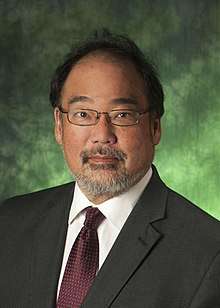John Ishiyama
John T. Ishiyama is an American political scientist. He is a University Distinguished Research Professor of Political Science and the Piper Professor of Texas at the University of North Texas. He studies comparative politics, particularly the party structure and democratization of Post-Soviet states, as well as the politics of Ethiopia.
John Ishiyama | |
|---|---|
 | |
| Born | |
| Nationality | American |
| Alma mater | |
| Awards |
|
| Scientific career | |
| Fields | |
| Institutions | |
Education and early work
Ishiyama grew up in Parma, Ohio.[1] He has credited his decision to become a political scientist with an early interest in how things change and evolve.[1] Ishiyama attended Bowling Green State University, graduating with a BA in political science and history in 1982.[2] He then pursued an MA at the University of Michigan's Center for Russian and East European Studies, graduating in 1985.[2] In 1992, Ishiyama earned a PhD in political science from Michigan State University.[2]
In 1990, Ishiyama joined the political science faculty at Truman State University, where he remained until 2008.[2] In 2008, Ishiyama moved to the University of North Texas.[2] Since 2002, he has also been affiliated with the Center for Russian and East European Studies at the University of Kansas.[2]
Career
By 2019, Ishiyama had been an author or editor of 8 books and more than 150 journal articles.[1] He was the sole editor of two books: From Bullets to Ballots: The Transformation of Rebel Groups into Political Parties (2018) and Communist Successor Parties in Post-Communist Politics (1999), and the coauthor with Marijke Breuning of Ethnopolitics in the New Europe in 1998. Ishiyama was the sole author of the 2012 book Comparative Politics: Principles of Democracy and Democratization, which is an introduction to comparative politics that focuses on the question of what conditions promote or hinder democratic development.[2]
Ishiyama's 2014 article "Civil Wars and Party Systems" in the Social Science Quarterly won the Charles Bonjean Award for the best article published in the Social Science Quarterly each year.[3] His 2009 article "The Politics of Intercountry Adoption: Explaining Variation in the Legal Requirements of Sub-Saharan African Countries" in Perspectives on Politics won the Heinz Eulau Award for the best article published in the American Political Science Review and Perspectives on Politics each year.[1]
Ishiyama was the Editor-in-Chief of the American Political Science Review from 2012 until 2016.[4] He was previously the Editor-in-Chief of the Journal of Political Science Education, which is the journal of the education section of the American Political Science Association,[5] from 2004 until 2012.[2]
In 2018, Ishiyama won the American Political Science Association's Frank Johnson Goodnow Award, which "recognizes outstanding service to the political science community".[6] That year Ishiyama also received the Lifetime Achievement Award from the Political Science section of the American Political Science Association.[7] Ishiyama was the American Political Science Association's member of the month in July 2019,[1] and in March 2020 Ishiyama was the sole nominee for the election to become President of the American Political Science Association in the term that begins in 2021.[8] In 2020, Ishiyama was given the Eminent Faculty Award from the University of North Texas Foundation.[9]
Ishiyama's work has been cited, or he has been quoted, in media outlets like The Washington Post,[10] Vox,[11] and The Chronicle of Higher Education.[12]
Selected works
- "The Politics of Intercountry Adoption: Explaining Variation in the Legal Requirements of Sub-Saharan African Countries" in Perspectives on Politics (2009)
- Comparative Politics: Principles of Democracy and Democratization (2012)
- "Civil Wars and Party Systems", Social Science Quarterly (2014)
Selected awards
- Frank Johnson Goodnow Award, American Political Science Association (2018)[6]
- Lifetime Achievement Award, American Political Science Association Political Science section (2018)[7]
- Eminent Faculty Award, University of North Texas Foundation (2020)[9]
References
- "APSA Member of the Month: Dr. John Ishiyama, University of North Texas". American Political Science Association. 1 August 2019. Retrieved 26 March 2020.
- "John Ishiyama". University of North Texas. August 2019. Retrieved 26 March 2020.
- "John Ishiyama receives the Charles Bonjean Award". University of North Texas. 22 February 2016. Retrieved 26 March 2020.
- "New leaders for premier political science journal, APSR". Cambridge University Press. 23 February 2012. Retrieved 26 March 2020.
- "Instructions for Authors" (PDF). American Political Science Association. Retrieved 26 March 2020.
- "2018 Frank Johnson Goodnow Award (APSA) – John Ishiyama". American Political Science Association. 10 September 2018. Retrieved 26 March 2020.
- "Lifetime Achievement Award". UNT Department of Political Science on Facebook. 5 September 2018. Retrieved 26 March 2020.
- "Announcing the APSA 2020 Council Nominations". American Political Science Association. 20 March 2020. Retrieved 26 March 2020.
- "John Ishiyama Receives the University of North Texas Foundation's Eminent Faculty Award". American Political Science Association. 21 February 2020. Retrieved 26 March 2020.
- Kim Yi Dionne; Boniface Dulani (19 May 2014). "On the eve of Malawi's election". The Washington Post. Retrieved 26 March 2020.
- Beauchamp, Zack (18 June 2018). "Juche, the state ideology that makes North Koreans revere Kim Jong Un, explained". Vox. Retrieved 26 March 2020.
- Bartlett, Tom (29 October 2014). "Dartmouth and Stanford Apologize After a Political-Science Experiment Gone Wrong". The Chronicle of Higher Education. Retrieved 26 March 2020.